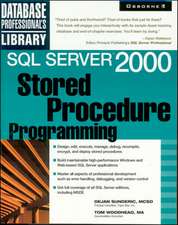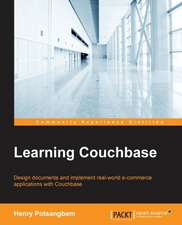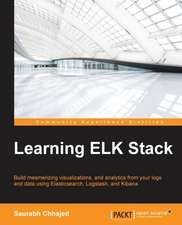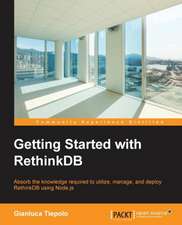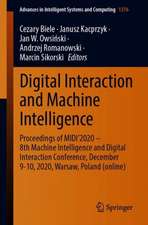Human Movements in Human-Computer Interaction (HCI): Studies in Computational Intelligence, cartea 996
Autor Cezary Bieleen Limba Engleză Hardback – 2 dec 2021
| Toate formatele și edițiile | Preț | Express |
|---|---|---|
| Paperback (1) | 907.57 lei 6-8 săpt. | |
| Springer International Publishing – 3 dec 2022 | 907.57 lei 6-8 săpt. | |
| Hardback (1) | 913.58 lei 6-8 săpt. | |
| Springer International Publishing – 2 dec 2021 | 913.58 lei 6-8 săpt. |
Din seria Studies in Computational Intelligence
- 50%
 Preț: 264.48 lei
Preț: 264.48 lei - 70%
 Preț: 235.75 lei
Preț: 235.75 lei - 20%
 Preț: 1138.71 lei
Preț: 1138.71 lei - 20%
 Preț: 970.01 lei
Preț: 970.01 lei - 20%
 Preț: 1428.22 lei
Preț: 1428.22 lei - 20%
 Preț: 168.78 lei
Preț: 168.78 lei - 18%
 Preț: 1093.52 lei
Preț: 1093.52 lei - 20%
 Preț: 565.38 lei
Preț: 565.38 lei - 20%
 Preț: 638.34 lei
Preț: 638.34 lei - 20%
 Preț: 1030.03 lei
Preț: 1030.03 lei - 20%
 Preț: 1552.26 lei
Preț: 1552.26 lei - 20%
 Preț: 632.66 lei
Preț: 632.66 lei - 20%
 Preț: 646.41 lei
Preț: 646.41 lei - 20%
 Preț: 976.52 lei
Preț: 976.52 lei - 20%
 Preț: 974.09 lei
Preț: 974.09 lei - 20%
 Preț: 973.27 lei
Preț: 973.27 lei - 20%
 Preț: 1146.00 lei
Preț: 1146.00 lei - 20%
 Preț: 1420.10 lei
Preț: 1420.10 lei - 20%
 Preț: 1024.36 lei
Preț: 1024.36 lei - 20%
 Preț: 1030.03 lei
Preț: 1030.03 lei - 20%
 Preț: 1028.39 lei
Preț: 1028.39 lei - 18%
 Preț: 2458.20 lei
Preț: 2458.20 lei - 20%
 Preț: 972.45 lei
Preț: 972.45 lei - 20%
 Preț: 1146.00 lei
Preț: 1146.00 lei - 20%
 Preț: 1144.40 lei
Preț: 1144.40 lei - 20%
 Preț: 1025.17 lei
Preț: 1025.17 lei - 20%
 Preț: 1435.50 lei
Preț: 1435.50 lei - 18%
 Preț: 1379.82 lei
Preț: 1379.82 lei - 18%
 Preț: 1105.93 lei
Preț: 1105.93 lei - 20%
 Preț: 1021.92 lei
Preț: 1021.92 lei - 20%
 Preț: 991.11 lei
Preț: 991.11 lei - 20%
 Preț: 1027.60 lei
Preț: 1027.60 lei - 20%
 Preț: 1253.88 lei
Preț: 1253.88 lei - 20%
 Preț: 1022.74 lei
Preț: 1022.74 lei - 20%
 Preț: 971.65 lei
Preț: 971.65 lei - 20%
 Preț: 1150.03 lei
Preț: 1150.03 lei - 20%
 Preț: 1142.76 lei
Preț: 1142.76 lei - 20%
 Preț: 1041.37 lei
Preț: 1041.37 lei - 20%
 Preț: 1144.40 lei
Preț: 1144.40 lei - 20%
 Preț: 1146.83 lei
Preț: 1146.83 lei - 20%
 Preț: 1434.72 lei
Preț: 1434.72 lei - 18%
 Preț: 988.76 lei
Preț: 988.76 lei - 20%
 Preț: 980.55 lei
Preț: 980.55 lei - 20%
 Preț: 1038.11 lei
Preț: 1038.11 lei - 20%
 Preț: 1262.78 lei
Preț: 1262.78 lei - 20%
 Preț: 977.30 lei
Preț: 977.30 lei - 20%
 Preț: 1031.01 lei
Preț: 1031.01 lei - 20%
 Preț: 927.84 lei
Preț: 927.84 lei - 20%
 Preț: 1153.30 lei
Preț: 1153.30 lei - 20%
 Preț: 1433.08 lei
Preț: 1433.08 lei
Preț: 913.58 lei
Preț vechi: 1141.98 lei
-20% Nou
Puncte Express: 1370
Preț estimativ în valută:
174.90€ • 181.80$ • 145.01£
174.90€ • 181.80$ • 145.01£
Carte tipărită la comandă
Livrare economică 08-22 februarie 25
Preluare comenzi: 021 569.72.76
Specificații
ISBN-13: 9783030900038
ISBN-10: 3030900037
Pagini: 142
Ilustrații: IX, 142 p. 5 illus., 3 illus. in color.
Dimensiuni: 155 x 235 mm
Greutate: 0.4 kg
Ediția:1st ed. 2022
Editura: Springer International Publishing
Colecția Springer
Seria Studies in Computational Intelligence
Locul publicării:Cham, Switzerland
ISBN-10: 3030900037
Pagini: 142
Ilustrații: IX, 142 p. 5 illus., 3 illus. in color.
Dimensiuni: 155 x 235 mm
Greutate: 0.4 kg
Ediția:1st ed. 2022
Editura: Springer International Publishing
Colecția Springer
Seria Studies in Computational Intelligence
Locul publicării:Cham, Switzerland
Cuprins
Introduction.- Face Movement.- Eye Movement.- Hand Movements Using Keyboard and Mouse.- Leg and Foot Movement.- Whole-body Movement.- Movement in Virtual Reality.- Movement in the Environment.- Perception of Movement.- Movement, Cognition and Learning.- Future Directions.
Textul de pe ultima copertă
This book discusses human–computer interaction (HCI) which is a multidisciplinary field of study which aims at developing and implementing tools and techniques to attain an effective and efficient interaction between the humans (the users) and computers. In recent years, there is an increase of interest of HCI researchers and practitioners in the inclusion of gaze gestures which can greatly enhance the communication between the human user and the computer, as well as other more “physical” communication involving all what can be learned from movements of the human body, from face, hand, leg, foot, etc., to the whole body movement, even extending to the involvement of groups of agents, even society. These explicitly human-centric issues in the development, design, analysis, and implementation of the HCI systems are discussed in the book. A comprehensive state of the art is given complemented with original own proposals. As opposed to more traditional formal and IT based analyses, the discussion is here more focused on relevant research results from psychology and psychophysiology, and other soft, cognitive, etc., sciences. Remarks on the relevance of affective computing are also mentioned.
Caracteristici
Shows what can be learned from movements of the human body, from face, hand, leg, and foot to the whole body movement Discusses these human-centric issues in the development, design, analysis, and implementation of the HCI systems Presents recent research on human movements in human–computer interaction (HCI)

